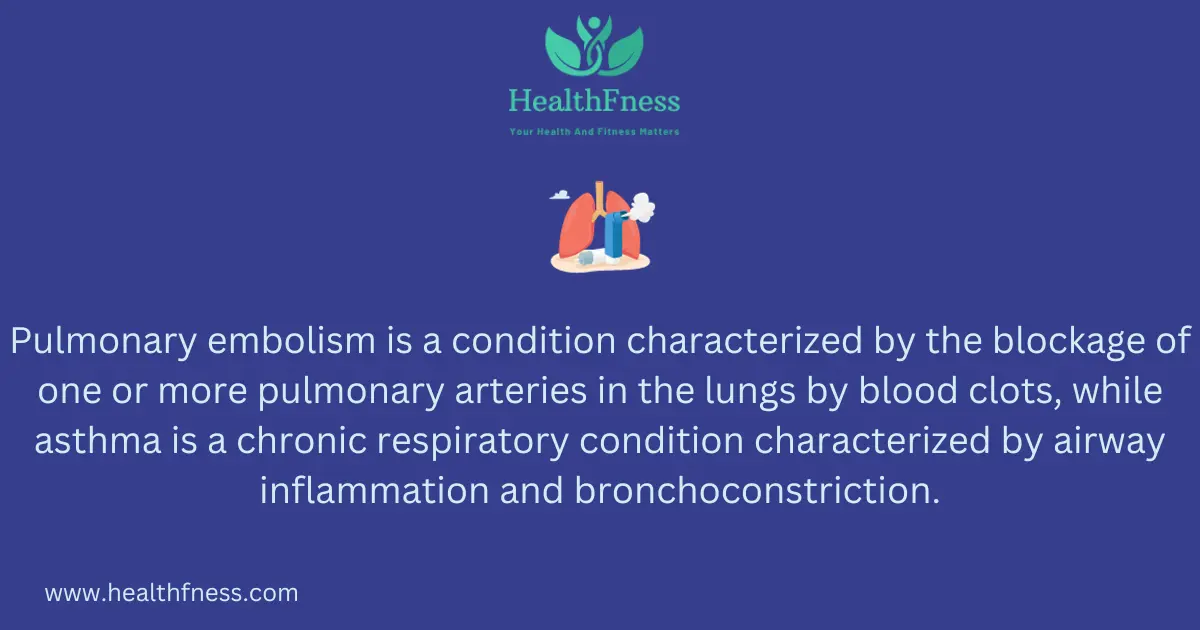Here, we’re diving into the surprising connection between pulmonary embolism and asthma. You’ll learn about symptoms, risks, and treatments for both conditions and explore how they can be related. Can pulmonary embolism cause asthma?
Let’s unravel this mystery together in a way that’s easy to understand. Get ready for a fascinating journey that may change how you think about these two health issues!
Can Pulmonary Embolism Cause Asthma?
Pulmonary embolism (PE) and asthma are two distinct medical conditions, but there can be some overlap in symptoms and risk factors. However, it’s important to clarify that pulmonary embolism itself doesn’t cause asthma. Let’s delve into this topic further to understand the relationship between the two conditions.
Understanding Pulmonary Embolism (PE)
A pulmonary embolism occurs when a blood clot (usually from the legs) travels to the lungs and blocks one of the pulmonary arteries. This blockage can cause symptoms such as sudden shortness of breath, chest pain, and coughing.
Understanding Asthma
Asthma is a chronic respiratory condition characterized by inflammation and narrowing of the airways, leading to symptoms such as wheezing, coughing, chest tightness, and shortness of breath. Asthma can be triggered by various factors, including allergens, exercise, and respiratory infections.
Possible Overlapping Symptoms
While the symptoms of pulmonary embolism and asthma can overlap, it’s essential to differentiate between the two conditions. Both can cause shortness of breath and chest discomfort, but pulmonary embolism typically presents with sudden onset and may be associated with other symptoms like leg swelling or coughing up blood, which are not typical of asthma.
Risk Factors and Associations
Some risk factors for pulmonary embolism, such as immobilization, surgery, or cancer, may also be associated with asthma exacerbations. Additionally, individuals with asthma may have an increased risk of developing blood clots due to factors like inflammation, medication use (such as corticosteroids), or limited mobility during asthma attacks.
In summary, while pulmonary embolism doesn’t directly cause asthma, there may be associations between the two conditions due to overlapping risk factors and physiological processes.
Understanding Asthma’s Role in Elevating Pulmonary Embolism Risk
Asthma can elevate the risk of developing pulmonary embolism through several mechanisms, including chronic inflammation leading to a prothrombotic state, corticosteroid use predisposing to venous thromboembolism, immobilization during severe asthma exacerbations promoting venous stasis, hypoxic pulmonary vasoconstriction increasing vascular injury risk, and underlying cardiovascular risk factors associated with asthma exacerbating thrombotic events.
These factors collectively contribute to an increased susceptibility to blood clot formation and pulmonary embolism in individuals with asthma, highlighting the importance of vigilant risk assessment and management strategies for this patient population.

You May Also Like To Read: Can Ear Infections Cause Diarrhea?
When Pulmonary Embolism Mimics Acute Severe Asthma?
One of the most perplexing scenarios is when a pulmonary embolism presents itself as an acute severe asthma attack. We’ll delve into case studies and real-life experiences to illustrate how this misdiagnosis can occur and the consequences it carries.
Navigating Pulmonary Embolism and Acute Severe Asthma
For individuals living with both conditions, life can be challenging. We’ll provide insights into managing these complex health issues, including medications, lifestyle modifications, and the importance of open communication with healthcare providers.
Pulmonary Embolism Symptoms, Causes, and Impact
To apprehend the intricate nexus between pulmonary embolism and asthma, it is imperative to acquire a profound understanding of both maladies. We shall proceed to delineate the manifestations, underlying origins, and consequential effects of pulmonary embolism. This foundational comprehension will serve as a robust bedrock for our ensuing exploration.
You May Also Like To Read: Does Hyaluronic Acid Cause Weight Gain?
Epidemiology of Acute Pulmonary Embolism
Numbers often speak louder than words. In this section, we’ll dive into the statistics surrounding acute pulmonary embolism, shedding light on its prevalence and demographics.
Crucial Steps in Managing Pulmonary Embolism and Asthma
Managing these conditions requires a holistic approach. We’ll discuss the essential steps in managing pulmonary embolism and asthma simultaneously, ensuring the best possible quality of life.
Asthma’s Connection to Pulmonary Embolism Risk
Asthma does not merely stand as a passive observer in the equation involving pulmonary embolism. We shall investigate the potential role of asthma in fostering the formation of thrombi and explore the measures individuals can undertake to diminish this risk.
Indicators of Pulmonary Embolism Risk
Recognizing the signs of pulmonary embolism risk is paramount, especially for those with asthma. We’ll provide a comprehensive list of indicators to watch out for, empowering you with knowledge.
Its Potential Role in Alleviating Pulmonary Embolism
Surprisingly, asthma medications may have a role in preventing blood clots. We’ll explore the science behind this and the potential benefits it offers to those at risk of pulmonary embolism.
Advances in Pulmonary Embolism Management
The medical field is constantly evolving. We’ll highlight the latest advancements in pulmonary embolism management, offering hope and improved outcomes for those affected.
Examining its Impact on Blood Clot Formation
To truly grasp the connection between pulmonary embolism and asthma, we must delve into the mechanisms of blood clot formation. This section will provide a comprehensive explanation of this intricate process.
Identifying and Understanding Pulmonary Embolism’s Signs
Familiarizing oneself with the indicators of pulmonary embolism holds pivotal significance in the context of early identification. We shall guide you through the warning signals that warrant expeditious medical intervention.
FAQS
Is there a relationship between pulmonary embolism and asthma?
Yes, there exists a plausible association between pulmonary embolism and asthma, where asthma may elevate the likelihood of experiencing a pulmonary embolic event.
Does pulmonary embolism affect breathing?
Undoubtedly, pulmonary embolism can exert a profound impact on respiration, giving rise to manifestations such as dyspnea and thoracic discomfort.
Can pulmonary embolism cause wheezes?
Indeed, pulmonary embolism can induce wheezing, thereby contributing to its potential misdiagnosis as asthma.
Why does pulmonary embolism cause difficulty breathing?
Pulmonary embolism disrupts the typical pulmonary blood flow, resulting in oxygen deprivation and respiratory distress.
Do blood clots cause asthma?
While blood clots themselves don't cause asthma, they can mimic asthma symptoms, leading to confusion in diagnosis.
Does an inhaler help pulmonary embolism?
No, an inhaler is not a treatment for pulmonary embolism. Urgent medical intervention is imperative in such cases.
Can asthma raise D dimer?
Yes, asthma can elevate D-dimer levels, which may be a marker of blood clot formation.
Do steroids help pulmonary embolism?
Steroids are not a primary treatment for pulmonary embolism; blood thinners are the standard therapy.
Do blood thinners cure pulmonary embolism?
Blood thinners help prevent further clot formation and allow the body to dissolve existing clots, but they don't "cure" pulmonary embolism.
What is the best treatment for pulmonary embolism?
The best treatment for pulmonary embolism involves blood thinners and, in severe cases, medical procedures to remove the clot.
Conclusion
As we draw the curtains on this expedition through the intricately intertwined realms of pulmonary embolism and asthma, we aspire to have bestowed a sense of lucidity upon the elusive query: Can pulmonary embolism induce asthma? While the correlation between these afflictions remains intricate, unraveling it can bestow individuals with the empowerment to assume control over their well-being.
The connection between pulmonary embolism and asthma remains a topic of continual investigation. Although the relationship is intricate, possessing knowledge about the potential synergy between these maladies empowers individuals to make informed choices regarding their well-being. If you harbor any symptoms or apprehensions, it is advisable to seek the counsel of a healthcare expert for a comprehensive assessment.
FOR FURTHER INFORMATION:
Pulmonary Embolism Mimicking Acute Severe Asthma.
Asthma increases pulmonary thromboembolism risk: a nationwide population cohort study
Pulmonary Embolism and Severe Asthma: Case Report and Literature Review

